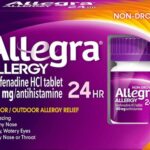Can You Take Allergy Medicine While Pregnant?

Allergies refers to abnormal reactions of the immune system that occur in response to otherwise harmless substances. Allergies are among the most common medical disorders, it is estimated that 60 million Americans or more than one in every five people, suffer from some form of allergy, with similar proportions throughout much of the rest of the world.
Allergies are very common in pregnancy, and not all women who experience them are long-term allergy sufferers. Pregnancy can also make seasonal allergies worse. Also, a condition called “rhinitis of pregnancy” can cause similar symptoms to seasonal allergies. This usually occurs in the last trimester. But the cause of rhinitis of pregnancy is extra hormones, not allergens.
Can allergy medications safely be used during pregnancy?
According to the American College of Allergy, Asthma and Immunology, antihistamines may be useful during pregnancy to treat the nasal and eye symptoms of seasonal or perennial allergic rhinitis, allergic conjunctivitis, the itching of urticaria (hives) or eczema, and as an adjunct to the treatment of serious allergic reactions, including anaphylaxis (allergic shock). With the exception of life-threatening anaphylaxis, the benefits from their use must be weighed against any risk to the fetus. Because symptoms may be of such severity to affect maternal eating, sleeping or emotional well-being, and because uncontrolled rhinitis may pre-dispose to sinusitis or may worsen asthma, antihistamines may provide definite benefit during pregnancy.
What allergy medicine can i take while pregnant?
Chlorpheniramine (ChlorTrimeton), and diphenhydramine (Benadryl) have been used for many years during pregnancy with reassuring animal studies. Generally, chlorpheniramine would be the preferred choice, but a major drawback of these medications is drowsiness and performance impairment in some patients.Two of the newer less sedating antihistamines loratadine (Claritin), and cetirizine (Zyrtec) have reassuring animal and human study data and are currently recommended when indicated for use during pregnancy.
The use of decongestants is more problematic. The nasal spray oxymetazoline (Afrin, Neo-Synephrine Long-Acting, etc.) appears to be the safest product because there is minimal, if any, absorption into the blood stream. However, these and other over-the-counter nasal sprays can cause rebound congestion and actually worsen the condition for which they are used. Their use is generally limited to very intermittent use or regular use for only three consecutive days.
Although pseudophedrine (Sudafed) has been used for years, and studies have been reassuring, there have been recent reports of a slight increase in abdominal wall defects in newborns. Use of decongestants during the first trimester should only be entertained after consideration of the severity of maternal symptoms unrelieved by other medications. Phenylephrine and phenylpropanolamine are less desirable than pseudophedrine based on the information available.
A corticosteroid nasal spray should be considered in any patient whose allergic nasal symptoms are more than mild and last for more than a few days. These medications prevent symptoms and lessen the need for oral medications. There are few specific data regarding the safety of intranasal corticosteroids during pregnancy. However, based on the data for the same medications used in an inhaled form (for asthma), budesonide (Rhinocort) would be considered the intranasal corticosteroid of choice, but other intranasal corticosteroids could be continued if they were providing effective control prior to pregnancy.
There are always risks when taking any medication during pregnancy. Women should talk with their doctors before taking allergy medicines to make sure they aren’t potentially harmful. While doctors consider many oral over-the-counter medications safe for seasonal allergies, using both oral and nasal spray decongestants isn’t as studied or well-known.





